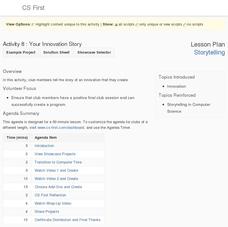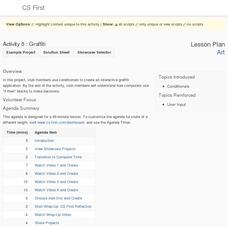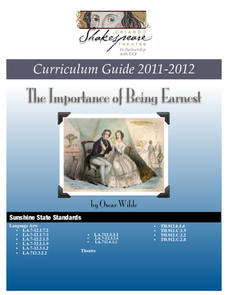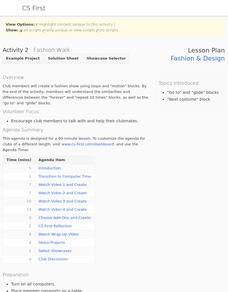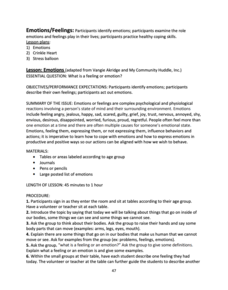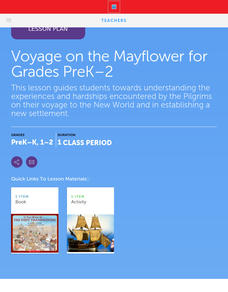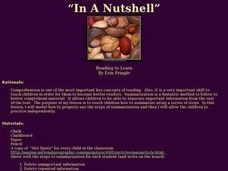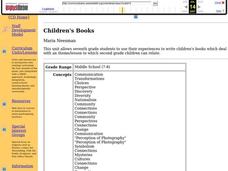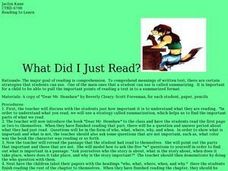Google
Storytelling: Your Innovation Story
Explore a trailblazing way to talk about innovation. Using the Scratch coding program, young computer scientists create innovations and write stories to accompany them. They include some of the add-ons they mastered throughout the unit.
Google
Art: Graffiti
Your principal won't mind graffiti, as long as it's on a virtual wall. Scholars use the Scratch block-based computer language to write a program on graffiti. The program lets users place certain designs on a wall.
Google
Adventure on the High Seas
Ahoy there! A fun computer science lesson challenges pupils to write a program that creates an ocean wave. They then develop stories to accompany their projects. All of this takes place within the Scratch coding program.
Orlando Shakes
The Importance of Being Earnest: Study Guide
Historically, members of the upper class provide plenty of fodder for comedic writers. Oscar Wilde's The Importance of Being Earnest is no exception, and a study guide for the classic play discusses some of the Victorian social issues he...
Google
Fashion and Design: Fashion Walk
Strut your stuff, just on a computer and not on a fashion runway. Scholars program a fashion show animation using block-based computer coding. They learn how to apply different code blocks in writing their programs.
Google
Animation: Studio Logo
Logos just make a club seem more fun. Scholars incorporate knowledge from previous lessons in the unit to write a computer program in the Scratch block-based language. Their program should help design a logo for the CS First studio. A...
San Diego County District Attorney
Emotions/Feelings
Three lessons delve deep into the topic of feelings and the importance of expressing one's emotions. Through grand conversation, hands-on learning experiences, and reflective writing, scholars interpret the ups and downs of everyday...
Scholastic
Voyage on the Mayflower
After completing an online activity about the Mayflower, scholars draw a picture about what they know of the Thanksgiving holiday, including a one-sentence summary. A reading of If You Were at the First Thanksgiving by Anne Kamma is the...
Curated OER
Penguin Paradise
Students read about penguins and communicate their information in a one paragraph summary. In this penguin writing lesson, students review sentence construction. Students complete a KWL about penguins and read the book Penguins Through...
Curated OER
In a Nutshell
Students summarize a non-fiction article in this lesson. They review a six step process for summarization. They then read the assigned article, and work as a class to write a summary using the five steps provided. They then write an...
Curated OER
Sum + It = Up
Students review silent reading techniques as well as summarization. They read copies of "Forest Life" silently and complete a story web to organize the main points of the story. They then use use the points to write a brief paragraph to...
Curated OER
Made for the Movies
Young scholars create a movie flyer to advertise the novel that the class has just finished reading in small groups. They search the Internet, format their flyer, select a slogan for their film, write a brief plot summary, without giving...
Curated OER
Let's Get Ready to Summarize
Pupils practice a summarizing strategy in this lesson. They are given a copy of a "National Geographic Kids" article and are encouraged to read it silently. They then use the steps provided to write an individual summary of the article.
Curated OER
Summing Up SuperCroc
Students read an article in a magazine about crocodiles silently, remembering not to make a sound, and trying hard to understand what the author is trying to tell them. They then write down some important facts they have read on a piece...
Curated OER
It's Raining Meatballs
Students participate in activities to determine their macro process and elaborative process abilities. During macro processes readers organize and summarize ideas as they read. They look at the big picture of the entire text as well as...
Curated OER
Student Writers get Feedback from Students on the Net
Third graders post writing pieces on an Internet site where they receive editing and revising information from students. They practice their revising skills by working on writing pieces of others that are posted on the Web.
Curated OER
Children's Books
Students explore daily dilemmas students face. They write and illustrate a story book dealing with one dilemma. Students write reviews of their books. They read their books to second grade students. Additional cross curriculum activities...
Curated OER
Recycling for Raptors
Students write persuasive letters in support of the Recycling for Raptors campaign. They review raptor groups and names and categorize the raptor species and the groups which they belong. They research businesses, schools, and...
Curated OER
Cuentos
Students revise Spanish mystery stories. They sequence the events from a group's mystery story and suggest revisions for the setting. They revise their stories using the suggestions from classmates and describe characters in folktales....
Curated OER
Christmas Poetry
Students explore writing using literary terms. In this Christmas poetry lesson, students write a poem about a Christmas tree or a snowman using at least one example of each: metaphor, simile, and personification.
Curated OER
Persuasive Letter Presenting the Case For Meeting the Need
Eighth graders choose from various works of literature, and participate in many activities regarding their chosen book. Students write persuasive papers and oral presentations discussing the needs of others.
Curated OER
To Be or Not To Be
Fifth graders investigate and conduct an interview associated with a career they are considering. They present the information in an expository writing piece using a different point of view.
Curated OER
Keyboarding - Dear "Here is Your Help"
Students work in pairs to draft a letter responding to a request for advice. They brainstorm a solution and write a response using a word processing program and correct letter format.
Curated OER
What Did I Just Read
Fourth graders write a summary for each chapter as they read a novel. They summarize the author's purpose and point of view after completing the novel. They also describe about how the author's point of view affected the novel.
Other popular searches
- Writing a Summary
- Writing a Summary Paragraph
- 4th Grade Writing Summary
- Writing a Chapter Summary
- Summary Writing Powerpoint
- Writing Summary
- Nonfiction Summary Writing
- Teaching Summary Writing
- Writing a Book Summary
- Chapter Summary Writing
- Writing a Summary "Esl"
- Summary Writing Activities


